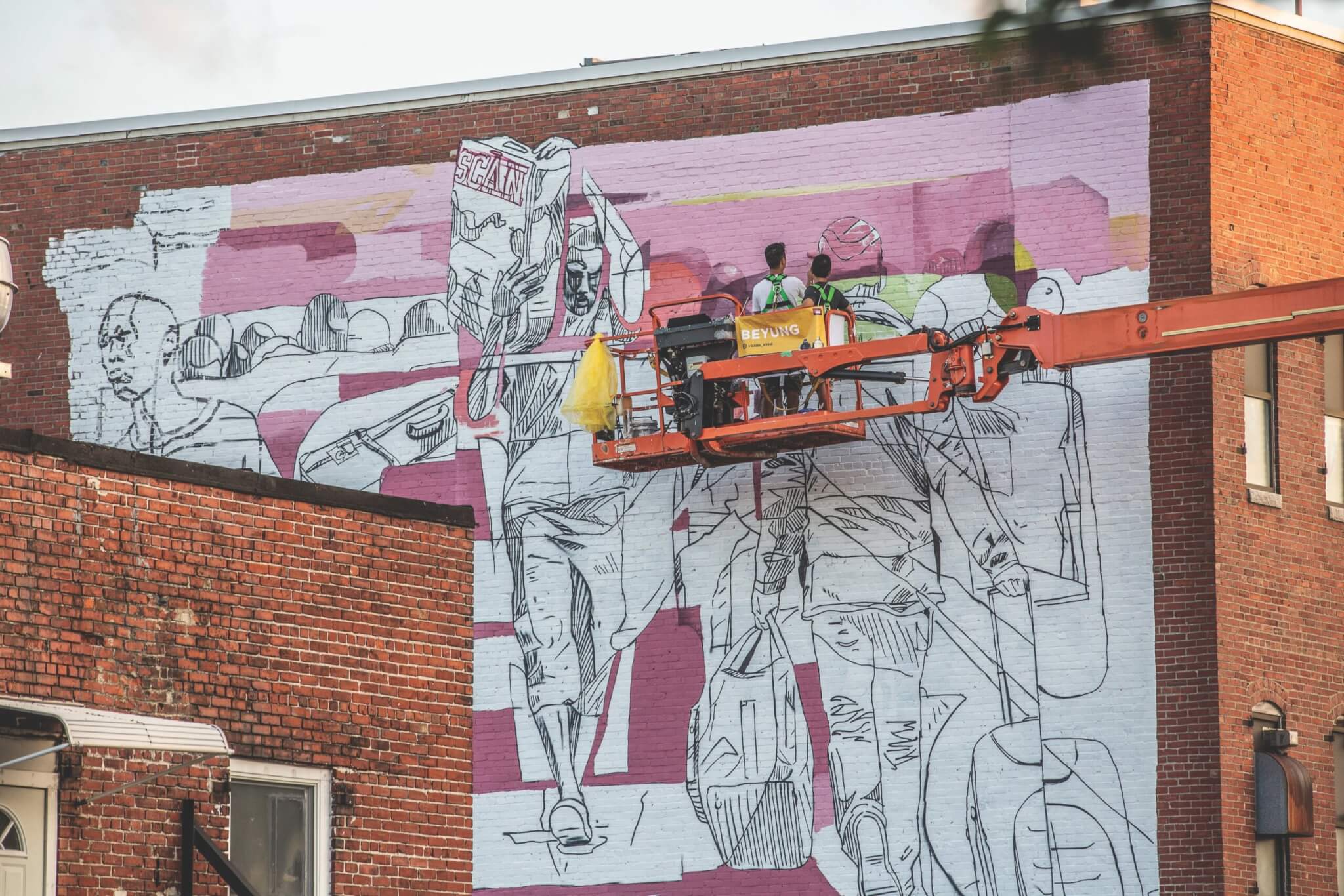The most charming moment of the Massachusetts Legislature’s Joint Committee on Tourism, Arts and Cultural Development October 21 public hearing was delivered courtesy of an artist.
Muralist Sharon Leshner testified to the committee in support of the PLACE Act, via Zoom, from her perch on a forklift in downtown Amherst, where she was at work on a new mural with support from the business improvement district. “Having an act like the PLACE Act is really a domino effect. The more support that we have, it always affects more artists because public art always works on a large scale. So when one artist is hired, that means that we get to train two other artists. That means that those people get to go out and they are our future artists.”
It was a moment that brought a smile to several faces of the legislature in the basement-level hearing room.
The PLACE Act was one of twenty-three bills under committee review that received testimony at this week’s hearing. The Creative Space Act (H.3587/S.2334) and the PLACE Act (H.3592/S.2332) were both developed by the Metropolitan Area Planning Council (MAPC), in collaboration with arts advocacy nonprofit MASSCreative. Both bills are specifically designed to foster community development by supporting artists and the creative economy in Massachusetts. They are part of a suite of five bills that MASSCreative wrote as part of a collaboration with MAPC starting in 2022, and which have since been working through the legislative process after being reintroduced in the legislative session this January.
Revitalizing Main Streets across the US remains a priority for legislatures in several states to counter the erosion of public life caused by a combination of the effects of inflation, challenges to brick-and-mortar retail by e-commerce, and the effects of the pandemic. Now, as blue states like Massachusetts expect to lose federal funding from cuts by the Trump administration, they are going to have to get creative to do it. With these bills, MAPC and MASSCreative are suggesting the arts can be an important part of civic revitalization and economic development efforts.
The Creative Space Act seeks to establish “creative space” and “presentation space” as land restriction designations, with the aim to preserve and create new exhibition, performance, and studio spaces in Massachusetts. Based on the Affordable Housing Trust Fund model, the bill proposes to create an option for municipalities to establish Municipal Creative Space Trust Funds, which will facilitate acquiring and maintaining properties with the creative space designation. If passed, the law would enact land restrictions on properties primarily used for activities related to creating or exhibiting creative work. Municipalities that establish Creative Space Trust Funds would form five-person boards of trustees that would administer the trust’s activities. The Creative Space Act is sponsored by State Senator Liz Miranda and Representative Dan Cahil.
The PLACE Act seeks to create a percent for public art program. Under the program, “one half of one percent” of construction costs of new build and renovation projects on state-owned buildings and property would be used to create and maintain public art. The bill sets a cap of $300,000 per public arts project. As part of this initiative, the bill would create a nine-person commission of representatives from local arts communities to set criteria for determining eligible works. This commission would be housed within the Office of Housing and Livable Communities. Projections estimate that this bill would generate $2.5 million dollars over five years to support public art in Massachusetts. The PLACE Act is sponsored by Representatives Mary Keefe and Steve Ultrino as well as State Senators Robyn Kennedy and Paul Mark. During the hearing, MAPC director of arts and culture, Dr. Annis Whitlow Sengupta, testified that “According to the NEA, the arts added $29.7 billion to our economy in 2023, a $1.6 billion increase from 2020. Given current economic uncertainties, proactive support is needed. During the pandemic, the arts economy declined at nearly twice the rate of the economy, with production dropping by 6.4%, compared to 3.4% overall.”
The Creative Space Act will use policy to help maintain artists’ access to the spaces needed to make and exhibit their work, whereas the PLACE Act will give cities the funding infrastructure to keep public art in cities. Britt Ruhe, executive director of Springfield-based organization Common Wealth Murals, testified, “Murals that have become icons of community identity are lost not because they aren’t valued but because there are no funds to protect and preserve them. In Springfield, the city no longer allows murals on city-owned buildings for that very reason.”
As part of their advocacy strategy for the passage of these bills, both organizations are quick to translate the impact of artists to the general economy. Referencing anticipated federal budget cuts in 2026, Kelsey Rode, director of external relations with MASSCreative, noted via written statement, “We are in a moment where everyone is making difficult budget decisions and we need to look at investing in the creative economy as a necessary part of investing in the general economy. For every dollar invested in the creative economy, we generate about $2.50 in return. Our towns, cities, and state are not in positions to turn away proven revenue generators.”
The committee will continue to receive public testimony on both bills. December 3 is the anticipated date they will release their determination whether the bills will advance to the Ways and Means Committee, the next step in the process to moving toward a vote on the floor. Other possible fates include the committee requesting revisions, extending their time for review, or simply killing the bills. Both bills are part of MASSCreative’s Creative Sector Agenda, which kicked off with a listening tour and survey of stakeholders in 2022. If they are passed by a vote on the floor they would be enacted in the 2027 fiscal year.
As the public awaits the committee’s decision, MASSCreative and MAPC are continuing their advocacy work encouraging area stakeholders to call their legislators and voice their support of these bills.

